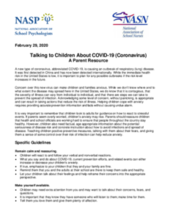Displaying 691 - 700 of 2221
This guide summarizes findings from relevant literature on what helps emerging adults (including youth transitioning from foster care) succeed, describes examples of how US communities are innovating to meet those needs, and shares key takeaways from interviews with emerging adults.
In this story for the March 2020 issue of the Atlantic, David Brooks writes about U.S. society's "shift from bigger and interconnected extended families to smaller and detached nuclear families" and the "devastation it has wrought," including how it "ultimately led to a familial system that liberates the rich and ravages the working-class and the poor."
The primary aim of this chapter is to outline the significance of trauma in the lives of parents involved in the child protection system who are sent for forensic psychological evaluations.
This study describes the community-based needs of parents with psychiatric disabilities who experienced legal challenges to their parenting rights.
This resource provides specific guidance to parents on how to talk to children about, and help them understand, the COVID-19 crisis.
This comic is based on a radio story that NPR education reporter Cory Turner did. He asked some experts what kids might want to know about the new coronavirus discovered in China.
The present study investigated the relationship of current foster parents’ communication with his/her foster child on foster parents’ perceptions of relational and child well-being.
In this pilot study, sixteen youth between ages 18 and 20 participated in semi-structured interviews, support mapping, and resiliency measurements to gather the experiences of the transition from foster care.
This study draws on data from the [STUDY] and the National Student Clearinghouse to examine the roles that Education and Training Vouchers (ETVs) and campus support programs (CSPs) play in promoting college persistence for foster youth.
This article discusses the implications of the influx of parents into the child welfare system for welfare authorities, using the U.S. state of Florida as an example.



